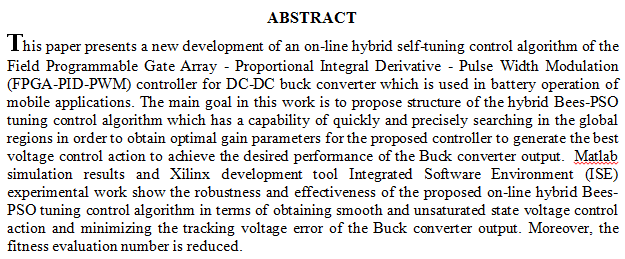
وفقأ للدراسات السابقة تم تحضير ليكاند آزو جديد (ن-(3-اسيتايل-2-هيدروكسي-5-مثيل-فنيل)ن-(4-كاربوكسي-سايكلوهكسيل مثيل)-ملح الدايازونيوم) وبعد التحقق من الصيغة المقترحة وفق نتائج التحاليل وبعد استخدام الليكاند لتحضير سلسلة ن المعقدات باستخدام نسب مولية متساوية (1:1) من الليكاند وتفاعلها مع كل من املاح المنغنيز والكوبلت والنيكل والنحاس والخارصين وبعد التحقق وفق تقنيات التحاليل الطيفية والتشخيصية(الاشعة فوق البنف
... Show More (3)
(3)
Nanomaterials, including nanoparticles such as iron oxide nanoparticles, have received great attention from researchers due to their unique properties and applications. There are several diverse methods, including chemical, physical, and green biological methods, to prepare iron oxide nanoparticles. The green method was chosen because it is safer, purer, and less toxic compared to other methods. Therefore, the green method is a promising and environmentally friendly method in the near future. The aqueous extract of Iraqi orange leaves was used to prepare nano iron oxide, it was examined structurally and spectrally by several techniques (X-ray diffraction- XRD, Fourier transform infrared - FT-IR, field emission scanning electron micr
... Show More (14)
(14)
 (13)
(13)
E-wallet, also referred to as digital wallet, is a software application designed to replace physical wallets, with the primary purpose of facilitating online transactions when users wish to make virtual payments. Nowadays, E-wallets are not limited to mobile applications, but they have also been extended to wearable devices, such as smartwatches, enabling users to make payments via their watches. This research study focuses on three main E-wallet service providers in Malaysia, namely TouchNGo E-wallet, Boost, and Grab pay, as they are the top three E-wallets in the country. The aim of this paper is to explore the real-world implementation of E-wallets among mobile phone users in Malaysia, employing the Technology Adoption Model as the th
... Show More (3)
(3)
 (1)
(1)
When the financial resources of individuals and groups available, this will lead to increase the consumption ranges and sometimes reached to excessive especially to the categories that have little awareness about economic importance and its reflections. it seems that consumerism has increased in many countries including Iraq because of many factors, and the most important one is the availability of financial resources as a result of the increase in oil exports as well as the spread of consumption media department at various levels especially.
The division partitioning technique has been used to analyze the four electron systems into six-pairs electronic wave functions for ( for the Beryllium atom in its excited state (1s2 2s 3s ) and like ions ( B+1 ,C+2 ) using Hartree-Fock wave functions . The aim of this work is to study atomic scattering form factor f(s) for and nuclear magnetic shielding constant. The results are obtained numerically by using the computer software (Mathcad).
This paper was aimed to evaluate the polyurethane (PU) and polyurethane/polyvinyl chloride (90 wt. % / 10 wt. %) as organic coating of carbon steel substrate against marine environment (3.5 wt.% NaCl aqueous solution) as a severe corrosion environment . The electrochemical impedance spectroscopy (EIS) and fitting impedance data by ZsimpWin 3.22 software were used to estimate the physical barrier of the samples for different exposure times. Different equivalent electrical circuits were proposed for the physical barrier at different immersion times to get appropriate fitting .Both PU and PU/PVC coatings showed excellent corrosion protection ability for steel .The PU/PVC coating showed better protection and stability than PU coating against
... Show MoreBackground: Diabetes mellitus consists of a group of diseases characterized by abnormally high blood glucose levels. Glycated haemoglobin (HbA1c) is a form of haemoglobin used to identify the average concentration of plasma glucose over prolonged periods of time. It is formed in a non-enzymatic pathway by normal exposure of hemoglobin to high levels of plasma glucose, The main alterations observed in the saliva of Type 1 diabetic patients are hyposalivation and alteration in its composition, particularly those related to the levels of glucose. The aim of the present study was to assess the effect of Glycated haemoglobin level on the level of salivary glucose which may have an effect on oral health condition. Materials and methods
... Show More (1)
(1)
Abstract
This paper concerned with study the effect of a graphite micro powder mixed in the kerosene dielectric fluid during powder mixing electric discharge machining (PMEDM) of high carbon high chromium AISI D2 steel. The type of electrode (copper and graphite), the pulse current and the pulse-on time and mixing powder in kerosene dielectric fluid are taken as the process main input parameters. The material removal rate MRR, the tool wear ratio TWR and the work piece surface roughness (SR) are taken as output parameters to measure the process performance. The experiments are planned using response surface methodology (RSM) design procedure. Empirical models are developed for MRR, TWR and SR, using the analysis
... Show More
